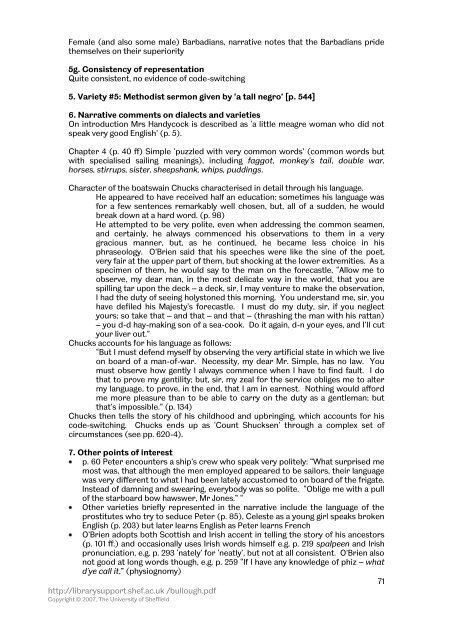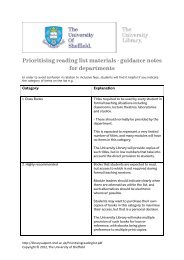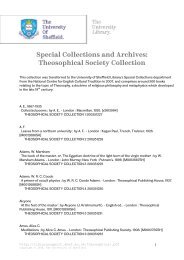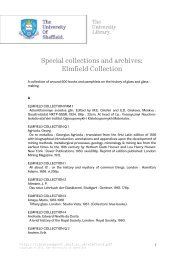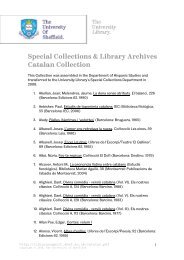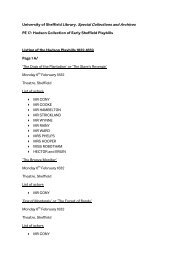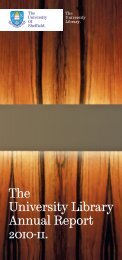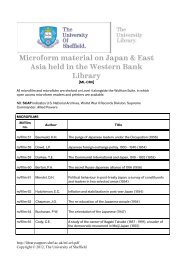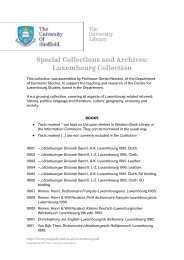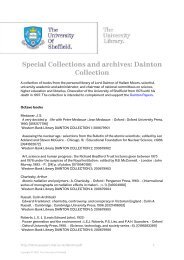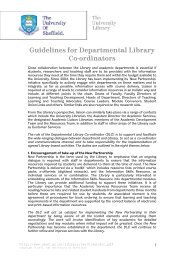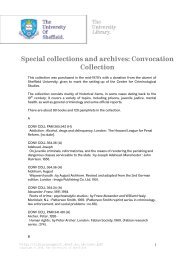The Geoffrey Bullough Collection - Temporary Home Page ...
The Geoffrey Bullough Collection - Temporary Home Page ...
The Geoffrey Bullough Collection - Temporary Home Page ...
You also want an ePaper? Increase the reach of your titles
YUMPU automatically turns print PDFs into web optimized ePapers that Google loves.
Female (and also some male) Barbadians, narrative notes that the Barbadians pride<br />
themselves on their superiority<br />
5g. Consistency of representation<br />
Quite consistent, no evidence of code-switching<br />
5. Variety #5: Methodist sermon given by „a tall negro‟ [p. 544]<br />
6. Narrative comments on dialects and varieties<br />
On introduction Mrs Handycock is described as ‗a little meagre woman who did not<br />
speak very good English‘ (p. 5).<br />
Chapter 4 (p. 40 ff) Simple ‗puzzled with very common words‘ (common words but<br />
with specialised sailing meanings), including faggot, monkey‟s tail, double war,<br />
horses, stirrups, sister, sheepshank, whips, puddings.<br />
Character of the boatswain Chucks characterised in detail through his language.<br />
He appeared to have received half an education; sometimes his language was<br />
for a few sentences remarkably well chosen, but, all of a sudden, he would<br />
break down at a hard word. (p. 98)<br />
He attempted to be very polite, even when addressing the common seamen,<br />
and certainly, he always commenced his observations to them in a very<br />
gracious manner, but, as he continued, he became less choice in his<br />
phraseology. O‘Brien said that his speeches were like the sine of the poet,<br />
very fair at the upper part of them, but shocking at the lower extremities. As a<br />
specimen of them, he would say to the man on the forecastle, ―Allow me to<br />
observe, my dear man, in the most delicate way in the world, that you are<br />
spilling tar upon the deck – a deck, sir, I may venture to make the observation,<br />
I had the duty of seeing holystoned this morning. You understand me, sir, you<br />
have defiled his Majesty‘s forecastle. I must do my duty, sir, if you neglect<br />
yours; so take that – and that – and that – (thrashing the man with his rattan)<br />
– you d-d hay-making son of a sea-cook. Do it again, d-n your eyes, and I‘ll cut<br />
your liver out.‖<br />
Chucks accounts for his language as follows:<br />
―But I must defend myself by observing the very artificial state in which we live<br />
on board of a man-of-war. Necessity, my dear Mr. Simple, has no law. You<br />
must observe how gently I always commence when I have to find fault. I do<br />
that to prove my gentility; but, sir, my zeal for the service obliges me to alter<br />
my language, to prove, in the end, that I am in earnest. Nothing would afford<br />
me more pleasure than to be able to carry on the duty as a gentleman; but<br />
that‘s impossible.‖ (p. 134)<br />
Chucks then tells the story of his childhood and upbringing, which accounts for his<br />
code-switching. Chucks ends up as ‗Count Shucksen‘ through a complex set of<br />
circumstances (see pp. 620-4).<br />
7. Other points of interest<br />
p. 60 Peter encounters a ship‘s crew who speak very politely: ―What surprised me<br />
most was, that although the men employed appeared to be sailors, their language<br />
was very different to what I had been lately accustomed to on board of the frigate.<br />
Instead of damning and swearing, everybody was so polite. ―Oblige me with a pull<br />
of the starboard bow hawswer, Mr Jones.‖ ―<br />
Other varieties briefly represented in the narrative include the language of the<br />
prostitutes who try to seduce Peter (p. 85), Celeste as a young girl speaks broken<br />
English (p. 203) but later learns English as Peter learns French<br />
O‘Brien adopts both Scottish and Irish accent in telling the story of his ancestors<br />
(p. 101 ff.) and occasionally uses Irish words himself e.g. p. 219 spalpeen and Irish<br />
pronunciation, e.g. p. 293 ‗nately‘ for ‗neatly‘, but not at all consistent. O‘Brien also<br />
not good at long words though, e.g. p. 259 ―If I have any knowledge of phiz – what<br />
d‟ye call it,‖ (physiognomy)<br />
http://librarysupport.shef.ac.uk /bullough.pdf<br />
Copyright © 2007, <strong>The</strong> University of Sheffield<br />
71


